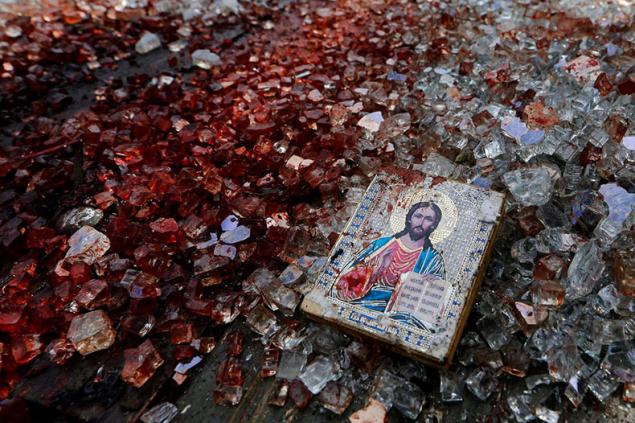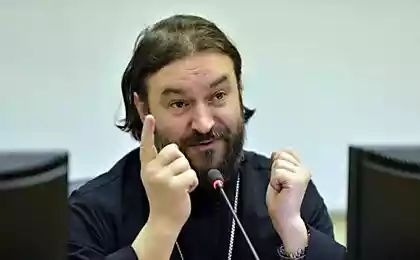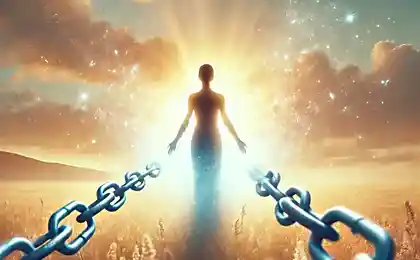190
Archpriest Nikolai Fomenko: How can we forgive those who cannot be forgiven by the heart?
Forgiveness Sunday is coming. Bright, joyful day before the beginning of Lent. The question of real, heartfelt reconciliation with neighbors has always been relevant. Sometimes it takes years of serious spiritual work to forgive an offender. Sometimes you let people go easily. Many Christians today find it difficult to forgive. Someone lost friends in ideological disputes, someone mourns the untimely departed loved ones, someone was left homeless.
How not to fall into the abyss of condemnation, curses, vengeance? This is what we're talking about. with the noble Alexander Nevsky district in Slavyansk, the rector of the Alexander Nevsky Cathedral Archpriest Nikolai Fomenko.

- Father Nicholas, now, on the eve of Lent, we are waiting for the last milestone of preparation for it - Forgiveness Sunday. The current political situation has put many Orthodox people, even those who are deeply churched and experienced, in a difficult situation: we need to forgive those whom we do not want to forgive, whom principles do not allow to forgive. And often such a person does not know how to be: he cannot lie to himself, but neither can he ask for forgiveness and forgive.
- It is difficult to call such a person an experienced Orthodox if he does not know what to do. I think he does. An Orthodox person remembers first of all the prayer “Our Father”, the prayer of the Lord, which God Himself commanded us, where it is said: “And leave us our debts, just as we also leave our debtor.” On Forgiveness Sunday, we do this in particular: we forgive and hope that we will be forgiven. If we talk about the attitude of the Church to what is happening, then our function is to reconcile souls, to educate a person so that he is a citizen of Heaven, so that he is a man of Christ.
The Christian has in him the spirit of Christ. When we read the Gospel, the Lord does not give any hint that we should be vindictive. And even if it is difficult for us to experience the military events in which we lived and live today, we need to remember the feat of Job the Long-suffering, who in the Old Testament showed an example of patience. The Lord tested him and he was not hardened. We also have the icon of the Mother of God “Softening of Evil Hearts”, before which we pray not only to soften the hearts of enemies, but also to soften ourselves.
The current events in Donbas are a test for us, a very serious test. But we must pass it with dignity and not get angry at all. There are many cases when a situation is out of balance, angry. But we must remember that we are Christ. “By this all will know that you are my disciples, if you have love for one another” (John 13:35). Christ is focusing our attention on this, and this must be our task.
- What advice would you give to someone who comes to you and says, “I understand everything, I have to forgive, I’m trying, but I’m not succeeding?”
- When we want to do something for ourselves, we must remember that the Lord said, “Without Me you can do nothing.” (Jn 15:5)! We need to call for God's help. Turn your eyes to God and turn to Him. And where the human ends, there is divine help. Let us recall the parable of how a man saw his way of life, and at the time of trials, instead of two chains of footprints - his own and God - he saw one: it turned out that these were the traces of God carrying him in His hands. When a man turns to God, he turns to God with all his heart, and the Lord will not abandon him.
Recently I was driving in a car and there was a car across the road. I was bound to crash into it, only to have time to exclaim, “Lord, have mercy!” It was a cry from the heart. A miracle happened: I walked within millimeters of that car and didn't even get caught. I don't even know how it happened.
This is a cry to God, a cry, a prayer from our hearts should always be, and not just on duty phrases about pardon.
We must fervently pray to God that we do not go out of His way. So we don't have a sense of revenge for each other. We have many circumstances in life when great troubles happen, grief overtakes. But if a person reacts to all this, not knowing how to forgive, then he measures only misfortune with this measure. The most important thing is to remember that God allows certain circumstances of our sins for the sake of our sins, and if he allows it, then he sees that we have the strength to carry this cross. God doesn't give you a cross. This is not an evil punishment, but a merciful admonition. He points out our weaknesses, teaches us not to do bad things.
There is such an example from the lives of the saints, when the people could not tolerate an extremely evil ruler. People went to the desert to ask the elder for prayer. He said, I will pray that the Lord will change the ruler. After two weeks, people come and ask, What did God say? The elder said, The Lord says that this ruler is the best for you.
People say: “According to the field and berries”, “According to Senka hat”. People and rulers. And even if today we see that something does not suit us, we must first turn our attention to ourselves. No one will force us to live differently, no one will help us until we want to change ourselves. And in order to get on a normal path, you need to see that we are basically living wrong. You know? Not just repent of some sin, but completely change your way of life!
God’s warnings should be helpful to us. Of course, it is easy to tell those who are watching what is happening in our region. And for those who directly experience these events, it is very difficult. I don’t care what is happening in other cities today. We have experienced this ourselves, and I know what it is when not just the walls of the house shudder – the soul shudders! This is the worst thing: when everything turns in the soul. God forbid that the spiritual foundations that we acquired and acquired were destroyed, and now we may lose because of anger.
A believer needs to take care of himself in this regard. Do not drop nobility, educate yourself tirelessly. St. Seraphim of Sarov at one time recommended that all his spiritual children read more often in the Bible the life of Job the Long-suffering, of which I have already mentioned. We all remember him. But who among us is willing to accept God’s will as Job is? Who wants to reach that height?
- Father Nicholas, as a survivor of the shelling, a priest who served the Liturgy at the moments when the walls of the church shuddered from the explosions, have you experienced negative feelings towards those who did this? If so, how did you deal with it?
- I remember when we were communing at the altar of our church, a terrible shelling began. I was in a hurry to take communion as soon as possible. I did not have time to think anything bad, because there was the main task: to commune myself and to commune the parishioners. And one of our priests said only one sentence: “What kind of people are these?” Everything shuddered, glass poured out of stained glass, everything rang in the temple - and this man's most negative phrase was only this question to nowhere ...
I had the same thought at the time: people, let us have communion! Nothing was more important to us then. Just connect with God.
During fasting, getting rid of both sins and anger, it is necessary to always be with God. We recently celebrated the Lord’s Day. Everyone has a meeting with God, but you have to be ready for this meeting. That we should not be ashamed of our lives, that we, being Christ, should live accordingly. We want everyone who lives in a house to have one spirit, that is, that all family members live together. God wants us to live in the same house, the Church, in the same spirit with Him. Always remember what God wants from us.
Of course, when confronted with evil, humanly, one sometimes wants to respond, resist action, take revenge. For in the Gospel there is an episode: because they did not receive Christ in the same village, the apostles James and John said: “Lord! Do you want us to tell fire to come down from heaven and destroy them as Elijah did? But he turned to them and said, “You do not know what kind of spirit you are; for the Son of Man has come not to destroy human souls, but to save” (Luke 9:54-56). We must not have anger and vengeance: in this spirit the Lord does not educate us! This is the hallmark of Orthodoxy. If we live with Christ, everything will be added. The Lord will send us everything we need, and He will fill it up like Job the Long-suffering One!
- You can survive the loss of material. But how do you forgive more? If a Christian feels that on Forgiveness Sunday he is not ready, can not forgive the people who deprived him of his home, friend, loved one – how can he behave? What should he put all his efforts into this position? Forgiveness or something else? To increase the prayer rule, to aggravate the fast?
- First of all, when it comes to forgiveness, one should forgive the one who asks for forgiveness. In the situation you described, this is not the case. And in the soul, of course, there should never be anger. Even with the loss of a loved one. I had a situation in my life: my sister died because of the negligence of doctors. No fighting, in peacetime. Everyone was advised to go to court. Thank goodness God has given us the strength to endure it all.
It helps to realize that nothing happens without God’s will. I accepted the situation this way: it was going to happen, you can’t change anything, even if you blame or condemn someone in your heart. I had to accept it. Although it was a young woman who left because of absurdity. But without the will of God and hair from the head does not fall, and even the life and death of a person – all the more providential.
We want to always be alive and together. That's understandable! God wants us to be with Him. We all know that God is alive, one in the womb, one in this life, and one in the afterlife. One person said, It's like people living on different streets in the same city. I think that's how it is for God! He's just moving from street to street.
What matters here is the attitude of a person to how he accepts the will of God: someone humbles, someone rebels. We need to ask ourselves, “What does God forgive us?” When we cannot forgive others, we must look more often at our sins. And remember that the sins that we commit, the Lord washes away His blood. The more sins we confess, the more we must remember how much the Lord has forgiven us and how many times He has embraced us.
With Archpriest Nikolai Fomenko talked Ekaterina Shcherbakova
P.S. And remember, just by changing our consumption – together we change the world!
Join us on Facebook, VKontakte, Odnoklassniki
Source: www.pravmir.ru/kak-prostit-teh-kogo-proshhat-ne-pozvolyaet-serdtse/
How not to fall into the abyss of condemnation, curses, vengeance? This is what we're talking about. with the noble Alexander Nevsky district in Slavyansk, the rector of the Alexander Nevsky Cathedral Archpriest Nikolai Fomenko.

- Father Nicholas, now, on the eve of Lent, we are waiting for the last milestone of preparation for it - Forgiveness Sunday. The current political situation has put many Orthodox people, even those who are deeply churched and experienced, in a difficult situation: we need to forgive those whom we do not want to forgive, whom principles do not allow to forgive. And often such a person does not know how to be: he cannot lie to himself, but neither can he ask for forgiveness and forgive.
- It is difficult to call such a person an experienced Orthodox if he does not know what to do. I think he does. An Orthodox person remembers first of all the prayer “Our Father”, the prayer of the Lord, which God Himself commanded us, where it is said: “And leave us our debts, just as we also leave our debtor.” On Forgiveness Sunday, we do this in particular: we forgive and hope that we will be forgiven. If we talk about the attitude of the Church to what is happening, then our function is to reconcile souls, to educate a person so that he is a citizen of Heaven, so that he is a man of Christ.
The Christian has in him the spirit of Christ. When we read the Gospel, the Lord does not give any hint that we should be vindictive. And even if it is difficult for us to experience the military events in which we lived and live today, we need to remember the feat of Job the Long-suffering, who in the Old Testament showed an example of patience. The Lord tested him and he was not hardened. We also have the icon of the Mother of God “Softening of Evil Hearts”, before which we pray not only to soften the hearts of enemies, but also to soften ourselves.
The current events in Donbas are a test for us, a very serious test. But we must pass it with dignity and not get angry at all. There are many cases when a situation is out of balance, angry. But we must remember that we are Christ. “By this all will know that you are my disciples, if you have love for one another” (John 13:35). Christ is focusing our attention on this, and this must be our task.
- What advice would you give to someone who comes to you and says, “I understand everything, I have to forgive, I’m trying, but I’m not succeeding?”
- When we want to do something for ourselves, we must remember that the Lord said, “Without Me you can do nothing.” (Jn 15:5)! We need to call for God's help. Turn your eyes to God and turn to Him. And where the human ends, there is divine help. Let us recall the parable of how a man saw his way of life, and at the time of trials, instead of two chains of footprints - his own and God - he saw one: it turned out that these were the traces of God carrying him in His hands. When a man turns to God, he turns to God with all his heart, and the Lord will not abandon him.
Recently I was driving in a car and there was a car across the road. I was bound to crash into it, only to have time to exclaim, “Lord, have mercy!” It was a cry from the heart. A miracle happened: I walked within millimeters of that car and didn't even get caught. I don't even know how it happened.
This is a cry to God, a cry, a prayer from our hearts should always be, and not just on duty phrases about pardon.
We must fervently pray to God that we do not go out of His way. So we don't have a sense of revenge for each other. We have many circumstances in life when great troubles happen, grief overtakes. But if a person reacts to all this, not knowing how to forgive, then he measures only misfortune with this measure. The most important thing is to remember that God allows certain circumstances of our sins for the sake of our sins, and if he allows it, then he sees that we have the strength to carry this cross. God doesn't give you a cross. This is not an evil punishment, but a merciful admonition. He points out our weaknesses, teaches us not to do bad things.
There is such an example from the lives of the saints, when the people could not tolerate an extremely evil ruler. People went to the desert to ask the elder for prayer. He said, I will pray that the Lord will change the ruler. After two weeks, people come and ask, What did God say? The elder said, The Lord says that this ruler is the best for you.
People say: “According to the field and berries”, “According to Senka hat”. People and rulers. And even if today we see that something does not suit us, we must first turn our attention to ourselves. No one will force us to live differently, no one will help us until we want to change ourselves. And in order to get on a normal path, you need to see that we are basically living wrong. You know? Not just repent of some sin, but completely change your way of life!
God’s warnings should be helpful to us. Of course, it is easy to tell those who are watching what is happening in our region. And for those who directly experience these events, it is very difficult. I don’t care what is happening in other cities today. We have experienced this ourselves, and I know what it is when not just the walls of the house shudder – the soul shudders! This is the worst thing: when everything turns in the soul. God forbid that the spiritual foundations that we acquired and acquired were destroyed, and now we may lose because of anger.
A believer needs to take care of himself in this regard. Do not drop nobility, educate yourself tirelessly. St. Seraphim of Sarov at one time recommended that all his spiritual children read more often in the Bible the life of Job the Long-suffering, of which I have already mentioned. We all remember him. But who among us is willing to accept God’s will as Job is? Who wants to reach that height?
- Father Nicholas, as a survivor of the shelling, a priest who served the Liturgy at the moments when the walls of the church shuddered from the explosions, have you experienced negative feelings towards those who did this? If so, how did you deal with it?
- I remember when we were communing at the altar of our church, a terrible shelling began. I was in a hurry to take communion as soon as possible. I did not have time to think anything bad, because there was the main task: to commune myself and to commune the parishioners. And one of our priests said only one sentence: “What kind of people are these?” Everything shuddered, glass poured out of stained glass, everything rang in the temple - and this man's most negative phrase was only this question to nowhere ...
I had the same thought at the time: people, let us have communion! Nothing was more important to us then. Just connect with God.
During fasting, getting rid of both sins and anger, it is necessary to always be with God. We recently celebrated the Lord’s Day. Everyone has a meeting with God, but you have to be ready for this meeting. That we should not be ashamed of our lives, that we, being Christ, should live accordingly. We want everyone who lives in a house to have one spirit, that is, that all family members live together. God wants us to live in the same house, the Church, in the same spirit with Him. Always remember what God wants from us.
Of course, when confronted with evil, humanly, one sometimes wants to respond, resist action, take revenge. For in the Gospel there is an episode: because they did not receive Christ in the same village, the apostles James and John said: “Lord! Do you want us to tell fire to come down from heaven and destroy them as Elijah did? But he turned to them and said, “You do not know what kind of spirit you are; for the Son of Man has come not to destroy human souls, but to save” (Luke 9:54-56). We must not have anger and vengeance: in this spirit the Lord does not educate us! This is the hallmark of Orthodoxy. If we live with Christ, everything will be added. The Lord will send us everything we need, and He will fill it up like Job the Long-suffering One!
- You can survive the loss of material. But how do you forgive more? If a Christian feels that on Forgiveness Sunday he is not ready, can not forgive the people who deprived him of his home, friend, loved one – how can he behave? What should he put all his efforts into this position? Forgiveness or something else? To increase the prayer rule, to aggravate the fast?
- First of all, when it comes to forgiveness, one should forgive the one who asks for forgiveness. In the situation you described, this is not the case. And in the soul, of course, there should never be anger. Even with the loss of a loved one. I had a situation in my life: my sister died because of the negligence of doctors. No fighting, in peacetime. Everyone was advised to go to court. Thank goodness God has given us the strength to endure it all.
It helps to realize that nothing happens without God’s will. I accepted the situation this way: it was going to happen, you can’t change anything, even if you blame or condemn someone in your heart. I had to accept it. Although it was a young woman who left because of absurdity. But without the will of God and hair from the head does not fall, and even the life and death of a person – all the more providential.
We want to always be alive and together. That's understandable! God wants us to be with Him. We all know that God is alive, one in the womb, one in this life, and one in the afterlife. One person said, It's like people living on different streets in the same city. I think that's how it is for God! He's just moving from street to street.
What matters here is the attitude of a person to how he accepts the will of God: someone humbles, someone rebels. We need to ask ourselves, “What does God forgive us?” When we cannot forgive others, we must look more often at our sins. And remember that the sins that we commit, the Lord washes away His blood. The more sins we confess, the more we must remember how much the Lord has forgiven us and how many times He has embraced us.
With Archpriest Nikolai Fomenko talked Ekaterina Shcherbakova
P.S. And remember, just by changing our consumption – together we change the world!
Join us on Facebook, VKontakte, Odnoklassniki
Source: www.pravmir.ru/kak-prostit-teh-kogo-proshhat-ne-pozvolyaet-serdtse/






















